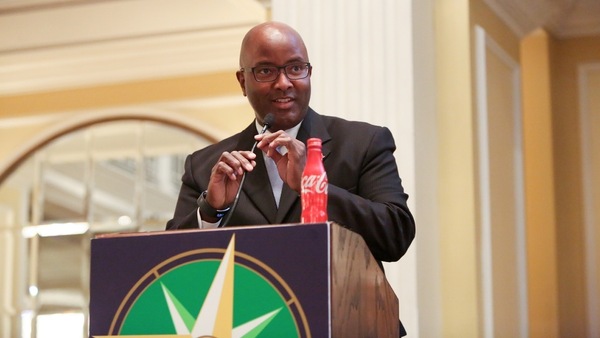
On April 24, 2017, the Notre Dame Initiative for Global Development (NDIGD) gathered its partners from the private, government, and non-profit sectors for the 2017 Notre Dame Global Pathways Forum at the historic Willard InterContinental hotel in Washington, D.C.
Supported by NDIGD and the Keough School of Global Affairs, the Notre Dame Global Pathways Forum continued NDIGD’s tradition of past impact forums, which it has hosted since 2011, while further focusing on the intersection between global development and business for good.
Nearly 100 guests convened around this year’s theme, “Co-Creation: Bridging the Value Chain and Investment Gap,” which Melissa Paulsen, associate director of education and training programs at NDIGD and the forum’s lead organizer, called “timely.”
“Social and/or environmental problems cannot be solved without the engagement of all stakeholders, including the community. I believe we are at an inflection point in terms of how we are addressing problems,” explained Paulsen. “Yes, there are many different organizations engaged in this work and many methodologies being discussed with solutions designed and implemented. But in order to achieve the greatest amount of impact, especially when resources are so limited, we must first make sure we are working on the right problems, and we must work together to design the solutions.”
Robert Bernhard, vice president for research at Notre Dame, opened up the forum with welcoming remarks. He was followed by two panels, titled “Corporate Social Responsibility and Sustainable Value Chains” and “Universities Partnering on Global Challenges: The Integration Lab,” respectively.
After lunch, which featured eight themed tables where roundtable discussions were facilitated, R. Scott Appleby, dean of the Keough School, welcomed the forum’s keynote speaker, Curtis L. Etherly, Jr., the director of federal affairs and international stakeholder relations for The Coca-Cola Company.
During his keynote, titled “The Ripple Effect: Our Journey Towards Sustainability Through Shared Value and Inclusive Business,” Etherly further examined the forum’s overarching themes of co-creation and business for good.
“At Coca-Cola, we recognize just how intertwined the success of our business is with the health and vitality of the communities that we serve across the globe. Vibrant communities in which opportunity abounds – culturally, economically, educationally, and socially – are communities in which not only our business can prosper, but those across all sectors of the local and national economy,” Etherly told the audience.
Etherly also discussed the necessity of cooperative partnerships between private entities like Coca-Cola and non-profits like Notre Dame.
“At Coca-Cola, we also recognize that no single actor can take on and solve our most pressing global challenges alone. Responses to threats such as water and food scarcity, lack of economic and educational opportunity for women and youth, and the like require the shared commitment and expertise of diverse partners from civil society, government, and the private sector,” Etherly said. “In the spirit of the oft-quoted African proverb: ‘If you want to go fast, go alone. If you want to go far, go together.’”
A Q&A session and two more panels, titled “Bridging the Impact Investing Gap” and “Corporate Ethics and Sustainability,” respectively, followed the keynote address. Michael Sweikar, managing director of NDIGD, delivered closing remarks.
Dozens of industry and government leaders from organizations including Accenture, Accion, Coca-Cola, Booz Allen Hamilton, GE, Inovateus Solar, MercyCorps, OPIC, the U.S. Agency for International Development (USAID), and TechnoServe were represented on panels and in the audience at this year’s forum, along with a number of Notre Dame administrators, faculty, staff, and alumni. To learn more about this year’s panelists, download the event program.
“The forum was a time for all of us to step away from our silos, from the good, heads-down work that we are all doing, to listen to new ideas, discuss new opportunities for partnership, and get re-invigorated with the work and impact that we are trying to accomplish,” said Paulsen. “There is no better time than now to bring the private, nonprofit, and government sectors together, and I’m proud that Notre Dame can be a convener and facilitator for these important discussions.”
View photos from the 2017 Notre Dame Global Pathways Forum on the NDIGD Facebook page
The Notre Dame Initiative for Global Development — an integral part of the new Keough School of Global Affairs at the University of Notre Dame — promotes human development and dignity among people worldwide through applied innovations, impact evaluation, education and training that help build just and equitable societies.
Contact: Luis Ruuska, communications specialist, Notre Dame Initiative for Global Development, lruuska@nd.edu
Originally published by at ndigd.nd.edu on May 16, 2017.